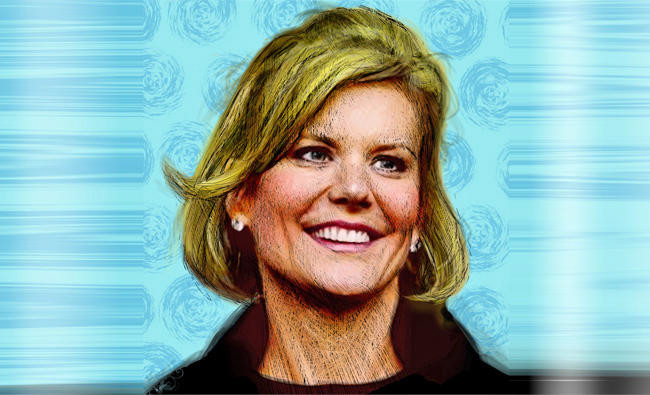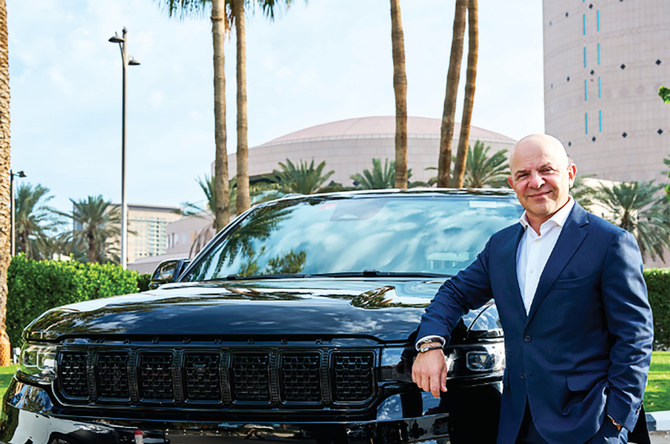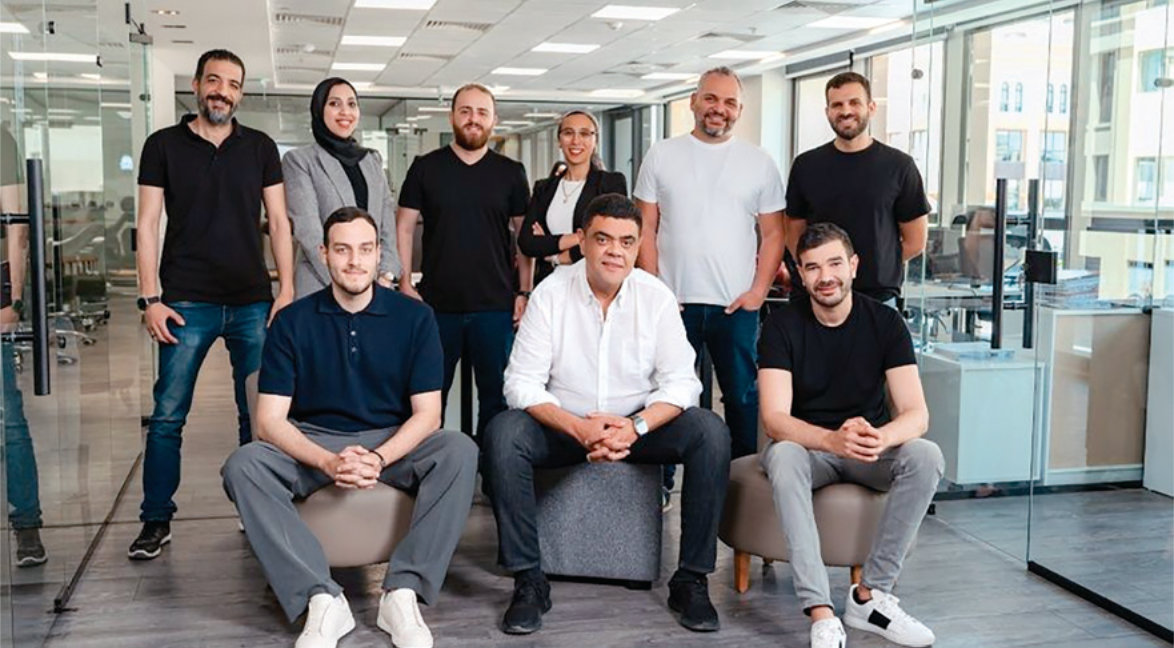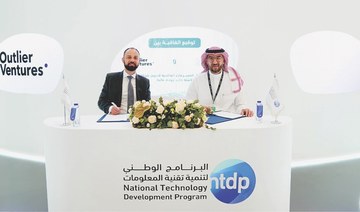LONDON: The British financier Amanda Staveley has come back from holiday on the Mediterranean island of Sardinia to handle some pressing matters for Arabian Gulf clients, and makes time for a breakfast meeting with Arab News.
We meet at her substantial townhouse just off Park Lane in London’s swanky Mayfair. It has to be over breakfast because the rest of her day will be taken up with client meetings before she heads back to her family.
But in the midst of a hectic flying visit, she will also be keeping one eye on events a few miles away in Southwark Crown Court, where the opening day of a rather important trial is taking place, one in which she has a very personal interest.
In Southwark, four former directors of the Barclays banking group were attending the opening day of a trial brought by the Serious Fraud Office (SFO), the UK’s main financial enforcer, on charges of alleged conspiracy to commit fraud in their dealings with Qatar investors in 2008, when the bank was effectively bailed out by the Arabian Gulf state.
Staveley — who was involved in similar deals for Abu Dhabi investors that fateful year — is also suing Barclays, through her investment vehicle PCP Capital Partners. PCP is claiming £720 million ($935 million) in damages plus interest and costs that will bring the total value of her lawsuit up to around £1 billion.
Eye-watering, even by Staveley’s standards. So her interest in the Southwark proceedings is understandable, not that she can say very much in public about it.
“My case will go ahead in about six months, and will be well over by the time the SFO trial even gets to court,” she says, picking at some fruit. “But the stress of all the confrontation with Barclays was terrible. I was heavily pregnant at the time and my baby was born very prematurely,” she says.
The baby, a boy, is 3 years old now and doing well, enjoying his Sardinian holiday with his father, Iranian-born businessman Mehrdad Ghodoussi.
I am planning to attend the Southwark hearing straight after breakfast with Staveley, and promise to keep her informed of proceedings there.
I had not seen her for some time since she left Dubai — where she once lived permanently — to bring her child up in her native UK. But she has the knack of slipping back into an easy familiarity and likes to hear gossip from the Arabian Gulf about the movers and shakers she still mixes with there.
Staveley is very interested in the big plans for economic transformation in Saudi Arabia, she says and quizzes me on the latest news. She believes the initial public offering (IPO) of Saudi Aramco is a good thing and would like to see London get at least some of the IPO action.
“If the Aramco IPO comes to London it will be great for the UK. Some institutions might have doubts about it maybe, but I think it is a good thing for the company, London and Saudi Arabia.
“The Saudi transformation has to happen. It has to create a critical mass and a better level of liquidity,” she says.
She sees enormous opportunity for her private equity company PCP Capital Partners in the $200 billion privatization program being prepared in tandem with the Aramco IPO.
“There are lots of things we want to do in Saudi Arabia. Technology investment is a big opportunity for us, and PCP has got a big Shariah-finance side,” she says, reeling off deals in real estate and diamonds she has recently seen through using Shariah-compliant sovereign bonds.
“I’m very excited about what is happening in Saudi (Arabia). There are big opportunities in infrastructure, funded by local bonds. We’ve done $7 billion to date in the Gulf in bond deals,” she says.
In particular, she would like to get involved in some of the transactions being planned by the Saudi investment giant Public Investment Fund (PIF), which is slated to become the biggest sovereign wealth fund in the world. PIF is part-funding the Vision Fund set up by Japanese financial institution SoftBank.
“We’d like to get involved with PIF in the Vision Fund, perhaps helping Abu Dhabi people invest more in that. I think we’ll be doing more advisory work on that,” Staveley says. Mubadala, the Abu Dhabi government investment group, also has a big interest in the Vision Fund.
“We have to find the big unicorns to invest in the Middle East. Like ARM Holdings, that was such a good deal. I loved that,” she says. The British semiconductor group ARM was bought by SoftBank last year for nearly $24 billion in one of the Vision Fund’s earliest deals.
Some of her and PCP’s most notable and profitable work came via contacts in the UAE capital, Abu Dhabi.
There was, of course, the deal that helped Barclays stay out of government ownership in 2008 with a cash injection from Sheikh Mansour bin Zayed Al-Nahyan, who put some £3.5 billion into the British banking group, which turned a healthy profit for the sheikh. Sheikh Mansour is not the subject of any investigation by the British authorities into the case.
According to the legend, Staveley got a £30 million fee for that transaction, but she has never publicly acknowledged that amount.
There was also some chatter that the size of that fee alienated her from the UAE establishment, but that does not seem to be the case.
She still talks about senior Emirati royals as friends and business partners, and regularly visits the region for top-level meetings.
And why would her investment partners not be happy with her efforts? Since the turn of the century, when she first got involved in investment in the region, she has helped enrich Arab investors in a number of areas, using her finely honed personal and investment skills to identify transactions that would appeal to them.
Just before the Barclays deal, she helped pull off the deal that has perhaps got Abu Dhabi more global publicity than any other — the purchase for £210 million of Manchester City Football Club for an investment group that included the same Sheikh Mansour.
New ownership with deep pockets enabled City to compete at the top level of European football and did more to raise the profile of Abu Dhabi than any of more mundane forays into the corporate world or real estate investment she helped arrange.
The City deal was pretty straightforward compared to another attempt at buying into the British national sport. In 2007, Dubai investors related to the ruling family took a long hard look at buying Liverpool Football Club, but the deal never materialized and the club was eventually sold to American investors who own it to this day.
Staveley’s interest in British football has not diminished, and she does not rule out another attempt to buy an English club on behalf of her investors. She has two clubs in her sights and is ready to go — at the right price.
Her career in investment began with deals in the Arabian Gulf, and investors there are still her mainstay, but she has broadened her source of funds these days.
“We (PCP) are a vanilla private equity fund but with sovereign investors, from the Gulf and China and elsewhere,” she says.
One thing on her mind, as it is for most people living in the Gulf region, is the standoff between Qatar and four of its neighbors — Saudi Arabia, the UAE, Bahrain and Egypt, the Anti-Terror Quartet — that has been an increasing concern for business people in the region.
She has been involved in some big deals for the Qataris, and as we talk in the heart of Mayfair she points to grand buildings that are owned by senior members of the Qatari royal family, which she helped them purchase. But she sees a danger of that source of income slowing as long as the current high-tension situation is maintained in the Gulf.
“The Qatar crisis certainly has affected business already. We were in the middle of one transaction and had to stop it. But I think they will calm it down. I expect good sense to prevail. Nobody benefits from conflict,” she says.
Staveley speaks from experience, because another big transaction for her, in the telecoms sector in Yemen, has been more or less put on hold due to the ongoing military confrontation there.
Whatever happens in the Gulf, it is very unlikely to change her mind about doing business in the region. “The Gulf has always been my love and I’m passionate about it,” she says.
Amanda Staveley: Doyenne of Mideast deal-doers sees ‘big opportunities’ in Saudi Arabia
Amanda Staveley: Doyenne of Mideast deal-doers sees ‘big opportunities’ in Saudi Arabia

Stellantis eyes expanding product range in Saudi Arabia, CEO says

- Dutch-based automobile manufacturer to introduce smart cars and light commercial vehicles into Saudi market
RIYADH: Dutch-based automobile manufacturing corporation Stellantis is planning to expand its product range in Saudi Arabia by introducing smart cars and light commercial vehicles into the market, an official has revealed.
In an interview with Arab News, Samir Cherfan, chief operating officer of Stellantis in the Middle East and Africa, said that the company’s Dare Forward 2030 plan aims to turn the automaker into a mobility tech company.
“Our approach in the Kingdom is multifaceted – and includes driving increased market share by expanding across brands and segments. This will be driven by introducing and expanding models including smart cars and light commercial vehicles under our Fiat, Citroen and Peugeot brands,” said Cherfan.
He added: “Moreover, Jeep is set to grow by reaching customers in new market segments while Ram will strengthen its position in the full-size pickup segment.”
Cherfan noted that Stellantis’ strategy in the Kingdom is aligned with Saudi Arabia’s Vision 2030 objectives.
He added that the company is committed to support Saudi Arabia’s economic diversification efforts and ongoing technological progress.
“By expanding our product range while improving efficiency and adopting new sustainable technologies, we aim not just for market dominance but also to support economic diversification and technological progress in Saudi Arabia,” he said.
Sustainability in focus
During the talk, the COO said that Stellantis’ move to reintroduce the Citroen brand in 2022 was to meet the rising demand for electric vehicles in the Saudi market, as the younger population in the Kingdom are giving priority to sustainability.
“In the Kingdom, Citroën offers a diverse range of vehicles that cater to young buyers – particularly in urban centers like Riyadh and Jeddah – including the growing number of women drivers,” said Cherfan.
He continued: “These younger demographics are typically looking for more sustainable, smaller, smarter models. As EVs produce zero emissions and zero noise, this in turn aligns with Vision 2030 objectives to enhance quality of life and reduce the Kingdom’s carbon footprint.”
According to Cherfan, Saudi Arabia’s economic diversification efforts aimed at reducing the Kingdom’s dependency on oil is also reshaping the automotive market in the country.
He added that Saudi Arabia’s sovereign wealth fund’s strategic investments in various sectors are also helping companies like Stellantis invest in the Kingdom.
“As the Kingdom is looking toward its post-oil economy and becoming more competitive internationally, this change is affecting the automotive market too. With the Public Investment Fund supporting the growth of the Kingdom’s economy by investing in different sectors, this opens doors for companies like Stellantis to invest and grow our business,” said Cherfan.
He added: “At Stellantis, we have a goal to increase our sales in Saudi Arabia and we believe that the Kingdom is a key to our plan to supply 90 percent of the cars and parts needed in the Middle East and Africa from within the region.”
The COO went on to say the company is planning to introduce new EV models in Saudi Arabia soon, as it eyes to grab 30 percent of this market by the end of this decade.
“When it comes to electrification, we are engaged with our Saudi Arabian partners with the objective of incorporating EV models or establishing dedicated EV brands within our product portfolios. Our aim is to have a 30 percent EV share by 2030 as set out in our Dare Forward Strategy,” he continued.
Encouraging local talents in the automotive industry
According to Cherfan, the automotive industry is an employment generator and is expected to grow at a double-digit rate till 2030 in Saudi Arabia as the Kingdom is embarking to ensure clean and autonomous mobility.
The official noted that the company currently has 12,000 employees in the Middle East and Africa region and among them only 20 are expats.
“In the Kingdom, through Stellantis and our distributor partners, we have over thousands of people working across different departments and under multiple brands, and we expect to continue to grow that number as our brands increase their market share,” said Cherfan.
He added that Stellantis aims to position itself as the most localized player in the region.
“We position ourselves as the partner in the country to maximize value creation. We have programs with universities, we have created dedicated training programs to upskill local talent. And with 1.2 billion people in our region, there is a lot of brilliant talent to be further developed,” continued Cherfan.
The company is aiming to achieve 70 percent regional production autonomy by 2030, representing a significant leap from its current level of 25 percent.
The COO said Stellantis aims to sell one million vehicles in the region by 2030, out of which 35 percent will be electric.
Strategic partnership with private and government entities
Cherfan further said that Stellantis’ strategy involves collaborating closely with local businesses, government entities and other stakeholders.
He pointed out that leveraging partnerships with local businesses is necessary to understand the market in Saudi Arabia, while collaborations with government entities is essential to navigate through regulatory frameworks.
“By working hand in hand with local companies, we can tailor our products and services to better meet the needs and expectations of Saudi consumers. Additionally, partnering with local businesses provides opportunities for technology transfer, skill development, and job creation, thereby contributing to the growth of the Saudi economy,” he noted.
Cherfan added: “By partnering with government agencies, we can ensure that our activities are in line with Saudi Arabia’s vision for economic diversification, sustainability, and innovation.”
He noted that government partnerships will also facilitate access to infrastructure and support programs, enabling the company to accelerate its growth and expansion efforts in the Kingdom.
Cherfan also underscored the vitality of collaborating with stakeholders like academic institutions, research centers and industry associations.
“Collaborating with these entities allows us to use cutting-edge research, innovation, and talent pools. By promoting partnerships with academia and research institutions, we can drive technological advancements, develop new products and solutions, and enhance our competitive edge in the Saudi market,” he concluded.
Egyptian startups secure funding to boost expansion to Saudi Arabia following a period of stagnation
Egyptian startups secure funding to boost expansion to Saudi Arabia following a period of stagnation

CAIRO: Startups in Egypt have started to gain momentum with several ventures securing funding to boost expansion efforts to the Kingdom.
Following a period of startup funding stagnation, Egyptian founders have made their way back to the regional venture capital space with a flurry of investment deals and expansion strategies already in place.
Egyptian fintech startup Waffarha has secured a seven-figure seed round from Value Makers Studio to expand its footprint.
Founded in 2012 by Tarek Magdy, the platform offers significant discounts, with daily deals ranging from 50 percent to 90 percent.
The new capital will enable Waffarha to enhance its technology, recruit talent, and expand into Saudi Arabia and additional markets.
Moreover, in 2018, Fawry for Banking Technology and Electronic Payments, one of Egypt’s largest financial institutions, acquired a share of 30 percent of the company.
The company claims to boast a network of over 1,000 merchants and over 3,000 stores that cater to more than 5 million customers, without any subscription fees.
Over the last 12 years, Waffarha claims to have emerged as a top-tier lifestyle website and mobile app.
Egyptian HRtech startup Bluworks secures $1m in pre-seed funding
Bluworks, an HR and Software-as-a-Service solutions provider based in Egypt, has raised $1 million in pre-seed funding led by Khawarizmi Ventures and included Camel Ventures, Acasia Ventures, and angel investors.
Founded in 2022 by Farah Osman, Hussein Wahdan, and Nour Ahmadein, Bluworks aims to optimize costs for businesses through data-driven decision-making.

“With so many HR softwares on the market, not one is built to manage blue-collar workers,” Wahdan said.
“Since the process of managing this type of workforce is so manual, errors frequently occur, leading to penalties and deducted salaries with no oversight from the workers, causing them to leave and ultimately contributing to high turnover rates,” he added.
“Currently, companies can spend about 7-10 days just closing their payroll accounts, but with Bluworks, this time can be cut down to one day - all while leveraging data and insights on their workforce,” he stated.
The company aims to utilize the funding to support its product development goals, expand its presence, and grow its team.
Egypt-based fintech Bokra closes $4.6m pre-seed funding round
Bokra, an emerging fintech startup from Egypt, has secured $4.6 million in pre-seed funding, led by DisrupTech Ventures and SS Capital.
Founded in 2023 by Ayman El-Sawy, Bokra offers diversified investment solutions for retail and SME investors.
The funds will support the launch of the Bokra app, expansion of its investment products, and scaling operations across the Middle East and North Africa region.
“We are dedicated to accelerating financial inclusion and elevating investment awareness across MENA,” El-Sawy said.
“In a region where financial needs and aspirations are ever-changing, Bokra is poised to become the preferred investment platform for both individuals and small and medium-sized enterprises looking to diversify their fractional ownership portfolio in a simple, trackable and informed way,” he added.

Egyptian startups win big in Saudi-Egyptian program
Ten Egyptian startups have received awards from the VMS Bridge program, aimed at enhancing connections between Egypt and Saudi Arabia’s entrepreneurial ecosystems.
Winners included Amanleek, Farhy, Sprints, Career180, and Jamaykaa, which will explore investment opportunities during a 4-day visit to the Kingdom.
Other winners, Notchnco and Neqabty, received free company licenses in Saudi Arabia, and AgriCash, ReNile, and ICareer won access to Arweqah’s training programs.
Jordan-based healthtech startup Arab Therapy secures $1m seed funding
Arab Therapy, a Jordan-based mental health platform, has raised $1 million in seed funding, led by Flat6Labs and Vision Health Pioneers, with participation from international angel investors.
Founded in 2021 by Tareq Dalbah, Omar Koudsi, and Hekmat Al-Hasi, Arab Therapy connects users with licensed mental health professionals.
The investment will facilitate the company’s market expansion and the initiation of business to business sales operations.
TVM Capital Healthcare invests $17m in Neurocare Group AG
TVM Capital Healthcare, based in the UAE, has invested $17 million into Neurocare Group AG, a Munich-headquartered healthtech specializing in personalized mental healthcare.
The investment will support Neurocare’s expansion plans in the US and Saudi Arabia and fund the development of new hardware and software innovations, enhancing their clinical solutions.
UAE-based logistics startup Shorages secures $1m for expansion
Shorages, a UAE-based logistics startup, has raised $1 million in a pre-series A funding round led by Joa Capital’s S3 Ventures Fund.
Founded in 2019 by Rayan Osseiran, the company provides fulfillment solutions in the UAE and Saudi Arabia for e-commerce platforms.
The company aims to utilize the funding to help expand its warehouse operations across the Gulf region.
UAE e-commerce startup WEE secures $12m in funding
UAE-based e-commerce startup WEE has concluded a $12 million pre-series A funding round, facilitated by SIG Investment.
Founded in 2021 by Anastasia Kim, Oleg Dashkevich, and Sergey Kolikov, WEE is an online marketplace that offers below 15-minutes delivery services.
The investment will be used to spearhead WEE’s logistics capabilities, accelerate growth, and expand its team.
Turkish fintech app Midas closes $45m funding round to boost MENA expansion
Turkish fintech app Midas closed a $45 million funding round by Portage, a global investment platform, supported by International Finance Corporation, Spark Capital and Earlybird Digital East Fund.
Founded by Egem Eraslan, the company allows users in Turkiye to invest in Turkish and US equities.

The startup is aimed at Turkiye’s retail investor market and claims to have more than 2 million users. The company claims to charge significantly lower transaction and commission fees for Turkish customers who want to invest in US or Turkish stocks.
Midas has plans to expand beyond Turkiye, and aims to target countries in the MENA region, according to a report by TechCrunch.
Midas also plans to use the new funding to roll out three new products in cryptocurrency trading, mutual funds and savings accounts.
UAE’s Maalexi signs agreement with Etihad Credit Insurance
Maalexi, a UAE-based risk management platform focused on SME agri-businesses, has entered into a strategic credit insurance agreement with Etihad Credit Insurance, the UAE’s federal export credit company.
This collaboration will enable Maalexi to utilize ECI’s extensive trade credit solutions and services, enhancing the competitiveness of regional SMEs in the food and agriculture trade sectors, both locally and internationally.
The partnership aims to reduce market entry barriers, support Maalexi’s goal of increasing SME participation in the cross-border trade of agricultural produce, and contribute to food security in the UAE.
Open Forum Riyadh to discuss digital currency, AI, and mental health

- The event will run in parallel to the WEF’s Special Meeting on Global Collaboration
LONDON: The Open Forum Riyadh — a series of public sessions taking place in the Saudi capital on Sunday and Monday — will “spotlight global challenges and opportunities,” according to the organizers.
The event, a collaboration between the World Economic Forum and the Saudi Ministry of Economy and Planning, will run in parallel to the WEF’s Special Meeting on Global Collaboration, Growth and Energy for Development, taking place in Riyadh on April 28 and 29.
“Under Saudi Vision 2030, Riyadh has become a global capital for thought leadership, action and solutions, fostering the exchange of knowledge and innovative ideas,” Faisal F. Alibrahim, Saudi minister of economy and planning, said in a press release, adding that this year’s Open Forum being hosted in Riyadh “is a testament to the city’s growing influence and role on the international stage.”
The forum is open to the public and “aims to facilitate dialogue between thought leaders and the broader public on a range of topics, including environmental challenges, mental health, digital currencies, artificial intelligence, the role of the arts in society, modern-day entrepreneurship, and smart cities,” according to a statement.
The agenda includes sessions addressing the impact of digital currencies in the Middle East, the role of culture in public diplomacy, urban development for smart cities, and actions to enhance mental wellbeing worldwide.
The annual Open Forum was established in 2003 with the goal of enabling a broader audience to participate in the activities of the WEF, and has been hosted in several different countries, including Cambodia, India, Jordan and Vietnam.
The panels will feature government officials, artists, civil-society leaders, entrepreneurs, and CEOs of multinationals.
This year’s speakers include Yazeed A. Al-Humied, deputy governor and head of MENA investments at the Saudi Pubic Investment Fund; Princess Reema Bandar Al-Saud, Saudi Arabia’s ambassador to the US; and Princess Beatrice, founder of the Big Change Charitable Trust and a member of the British royal family.
Michele Mischler, head of Swiss public affairs and sustainability at the WEF, said in a press release that the participation of the public in Open Forum sessions “fosters diverse perspectives, enriches global dialogue, and empowers collective solutions for a more inclusive and sustainable future.”
Meituan looks to hire in Saudi Arabia, indicating food delivery expansion

SHANGHAI: Chinese food delivery giant Meituan is seeking to hire staff for at least eight positions based in Riyadh, in a sign it may be looking to Saudi Arabia to further its global expansion ambitions, according to Reuters.
The jobs ads, which is hiring for KeeTa, the brand name Meituan uses for its food delivery operations in Hong Kong, is seeking candidates with expertise in business development, user acquisition, and customer retention, according to posts seen by Reuters on Linkedin and on Middle Eastern jobs site Bayt.com.
Meituan did not immediately respond to a request for comment by Reuters on its plans for Saudi expansion.
Bloomberg reported earlier on Friday that the Beijing-based firm would make its Middle East debut with Riyadh as the first stop.
Since expanding to Hong Kong in May 2023, Meituan’s first foray outside of mainland China, speculation has persisted that its overseas march would continue as the firm searches for growth opportunities, with the Middle East rumored since last year to be one area of possible expansion.
“We are actively evaluating opportunities in other markets,“ Meituan CEO Wang Xing said during a post-earnings call with analysts last month.
“We have the tech know-how and operational know-how, so we are quietly confident we can enter a new market and find an approach that works for consumers there.”
IMF opens first MENA office in Riyadh

RIYADH: The International Monetary Fund has opened its first office the Middle East and North Africa region in Riyadh.
The office was launched during the Joint Regional Conference on Industrial Policy for Diversification, jointly organized by the IMF and the Ministry of Finance, on April 24.
The new office aims to strengthen capacity building, regional surveillance, and outreach to foster stability, growth, and regional integration, thereby promoting partnerships in the Middle East and beyond, according to the Saudi Press Agency.
Additionally, the office will facilitate closer collaboration between the IMF and regional institutions, governments, and other stakeholders, the SPA report noted, adding that the IMF expressed its appreciation to Saudi Arabia for its financial contribution aimed at enhancing capacity development in its member countries, including fragile states.
Abdoul Aziz Wane, a seasoned IMF director with an extensive understanding of the institution and a broad network of policymakers and academics worldwide, will serve as the first director of the Riyadh office.

















